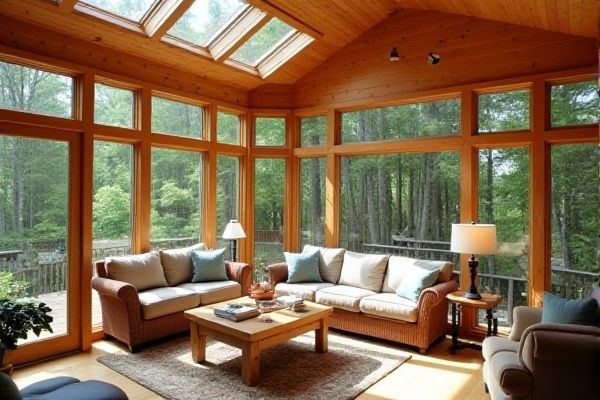
Wood frame sunrooms offer natural insulation and aesthetic warmth, enhancing your home's charm and energy efficiency, while aluminum frame sunrooms provide durability, low maintenance, and resistance to rust and termites. Explore the article to discover which sunroom option best suits your lifestyle and home needs.
Table of Comparison
| Feature | Wood Frame Sunroom | Aluminum Frame Sunroom |
|---|---|---|
| Material | Natural wood (pine, cedar, or oak) | Durable aluminum alloy |
| Durability | Moderate; prone to rot and insect damage | High; rust-resistant and weatherproof |
| Maintenance | Requires regular painting or sealing | Low maintenance; occasional cleaning |
| Insulation | Excellent thermal insulation | Moderate insulation; often requires thermal breaks |
| Cost | Higher initial cost and upkeep | Generally lower initial cost and long-term savings |
| Aesthetic Appeal | Warm, natural look; customizable finishes | Modern, sleek design; less customizable |
| Environmental Impact | Renewable, biodegradable material | Non-renewable, recyclable metal |
| Weight | Heavier; may require stronger foundation | Lightweight; easier to install |
Introduction: Comparing Wood Frame vs Aluminum Frame Sunrooms
Wood frame sunrooms offer natural insulation, superior aesthetics, and customization options that blend seamlessly with traditional home designs. Aluminum frame sunrooms provide exceptional durability, low maintenance, and resistance to rust and corrosion, ideal for climates with high humidity or frequent storms. Choosing between wood and aluminum frames involves balancing thermal efficiency and visual appeal against longevity and upkeep requirements.
Aesthetic Appeal: Design Options and Styles
Wood frame sunrooms offer a timeless aesthetic with rich textures and natural warmth, allowing for customizable designs that complement traditional and rustic architecture. Aluminum frame sunrooms provide sleek, modern lines with a variety of color finishes, ideal for contemporary and minimalist styles. Both materials support diverse design options, but wood frames excel in detailed craftsmanship while aluminum frames emphasize durability and a lightweight structure.
Durability and Longevity
Wood frame sunrooms offer natural insulation and aesthetic warmth but require regular maintenance to prevent rot, warping, and insect damage, potentially impacting long-term durability. Aluminum frame sunrooms provide superior resistance to rust, corrosion, and weather extremes, ensuring enhanced longevity with minimal upkeep. Both materials can last decades, but aluminum frames typically deliver greater durability in harsh climates.
Insulation and Energy Efficiency
Wood frame sunrooms offer superior insulation and energy efficiency due to the natural thermal resistance of wood, reducing heat transfer and maintaining consistent indoor temperatures. Aluminum frame sunrooms, while durable and low-maintenance, conduct heat more rapidly, often requiring additional thermal breaks or insulation to achieve similar energy performance. Choosing wood frames can result in lower heating and cooling costs, enhancing overall energy savings in sunroom applications.
Maintenance Requirements
Wood frame sunrooms require regular maintenance such as painting or staining to prevent rot, warping, and insect damage, making them more labor-intensive over time. Aluminum frame sunrooms are low-maintenance, resistant to rust, corrosion, and fading, often needing only occasional cleaning with water and mild detergent. The choice between wood and aluminum frames impacts long-term upkeep costs and durability in various weather conditions.
Cost Comparison: Initial Investment and Long-Term Value
Wood frame sunrooms typically have a higher initial investment due to the cost of quality lumber and skilled labor required for construction, but they offer excellent insulation and aesthetic appeal that can increase long-term home value. Aluminum frame sunrooms are more affordable upfront, with lower material and installation costs, and provide durability and low maintenance over time, making them a cost-effective option with minimal upkeep expenses. Considering energy efficiency and resale value, wood frames may provide greater long-term value in colder climates, while aluminum frames are advantageous in terms of longevity and resistance to weather-related wear.
Environmental Impact and Sustainability
Wood frame sunrooms offer superior environmental benefits due to their renewable nature and lower carbon footprint, as wood stores carbon throughout its lifecycle and is biodegradable. Aluminum frame sunrooms, while durable and recyclable, require high energy consumption during production and contribute more to greenhouse gas emissions. Choosing a wood frame sunroom supports sustainable building practices and reduces your overall environmental impact.
Customization and Flexibility
Wood frame sunrooms offer greater customization and flexibility, allowing you to tailor designs with intricate details, varied finishes, and unique architectural styles that blend seamlessly with your home's aesthetics. Aluminum frame sunrooms provide durability and low maintenance but come with more standardized design options and limited customization choices. Choosing a wood frame enhances your ability to personalize every aspect of the sunroom, from color to texture, ensuring it perfectly complements your space.
Weather Resistance and Performance
Wood frame sunrooms offer excellent insulation and a natural aesthetic but require regular maintenance to prevent weather damage such as rot and warping. Aluminum frame sunrooms provide superior weather resistance, resisting rust, corrosion, and extreme temperature fluctuations with minimal upkeep. Choosing an aluminum frame sunroom enhances durability and performance in harsh climates, ensuring your space remains comfortable and long-lasting.
Conclusion: Which Sunroom Frame is Best for You?
Wood frame sunrooms offer superior insulation and a classic, warm aesthetic ideal for traditional homes, while aluminum frame sunrooms provide exceptional durability, low maintenance, and modern appeal perfect for contemporary designs. Your choice depends on priorities like energy efficiency, upkeep, and style preferences, with wood excelling in thermal performance and aluminum standing out for weather resistance and longevity. Consider your local climate and maintenance willingness to determine which sunroom frame best complements your lifestyle and enhances your living space.
 homyna.com
homyna.com